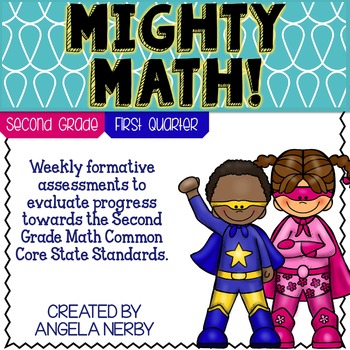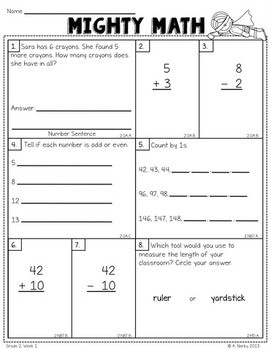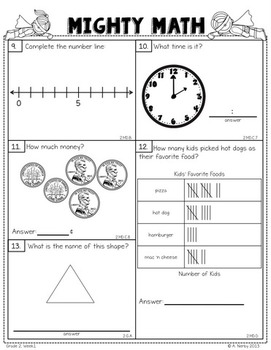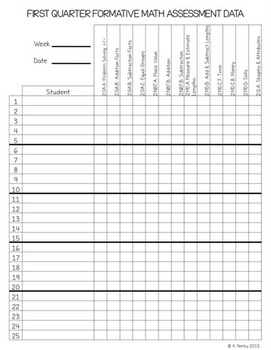SECOND GRADE Math Formative Assessments - First Quarter
- PDF
What educators are saying
Description
Mighty Math is a set of weekly formative assessments that can be used to evaluate progress towards the second grade math Common Core State Standards. All ten of the second grade CCSS are assessed each week:
2.OA.A: Represent and solve problems involving addition and subtraction.
2.OA.B: Add and subtract within 20.
---1 addition and 1 subtraction problem included on each assessment.
2.OA.C: Work with equal groups of objects to gain foundations for multiplication.
2.NBT.A: Understand place value.
2NBT.B: Use place value understanding and properties of operations to add and subtract.
---1 addition and 1 subtraction problem included on each assessment.
2.MD.A: Measure and estimate lengths in standard units.
2.MD.B: Relate addition and subtraction to length.
2.MD.C: Work with time and money
---1 time and 1 money problem included on each assessment
2.MD.D: Represent and interpret data.
2.G.A: Reason with shapes and their attributes.
This pack contains nine two-sided assessments, with 13 problems on each assessment. These assessments are intended to be used during the first quarter of second grade, although they would be great enrichment for first graders and/or good practice for third grade students. Take a peek at the other Second Grade Mighty Math sets:
This pack also includes answer keys and three different options for recording student data.
HOW I USE THESE ASSESSMENTS IN MY CLASS:
Every week, I have a shortened math period (50 minutes) due to my specials schedule. This is my Mighty Math Day. Students first complete their Mighty Math assessment. When students finish, they work independently on unfinished Math Journal pages from previous days or Compass Learning Odyssey (differentiated math website). I will then pull groups of students who struggled with specific skills on the previous week’s Mighty Math for reteaching and practice. I have found that using Mighty Math has given me a deeper understanding of my students' abilities and I can target specific skills that need reteaching.
Please download the preview to see what you'll be purchasing. The preview also includes a freebie you can try out in your classroom. Click HERE if you want to read more about the product on my blog.
LOOKING FOR SECOND GRADE MATH CCSS SUMMATIVE ASSESSMENTS?
Click Here!
DON'T TEACH SECOND GRADE?
Click HERE for Kindergarten
Click HERE for First Grade
Click HERE for Second Grade
Click HERE for Third Grade
Click HERE for Fourth Grade
If you have any questions, please do not hesitate to ask! Thanks for taking a look!
Angela :)





